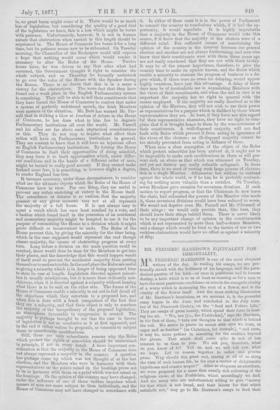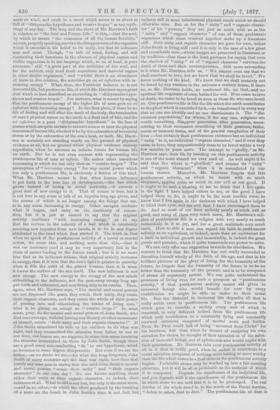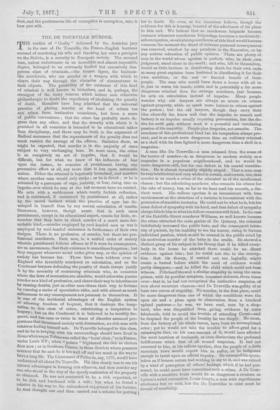MR. FREDERIC HARRISON'S EQUIVALENT FOR IMMORTALITY.
MR. FREDERIC HARRISON is one of the most eloquent writers of the day. In reading his essays, we are pro- foundly struck with the brilliancy of his language, and the para- doxical passion of his faith--at once in positivism and in human destiny, a faith which is to us at least as amazing as for a man to have the most passionate confidence at once in the energetic vitality of a worm which is destroying the root of a flower, and in the vitality of the flower itself. And the most striking illustration of Mr. Harrison's fanaticism, as we account it, is the powerful essay begun in the June and concluded in the July num- ber of the Nineteenth Century, on the " Soul and Future Life," They are essays of great beauty, which spend their force in beat- ing the air. " We, too [i.e., the Positivists]," says Mr. Harrison, in the first of them, " turn our thoughts to that which is behind the veil. We strive to pierce its secret with eyes we trust, as eager and as fearless" [as Christians, for example], " and even, it may be, more patient in searching for the realities beyond the gloom. That which shall come after is not of leas interest to us than to you. We ask you, therefore, what do you know of it? Tell us, and we will tell you what we hope. Let us reason together in sober and precise prose. Why should this great end, staring at all of us along the vista of each human life, be for ever a matter of dithyrambic hypotheses and evasive tropes?" After so eloquent an exordium, we were prepared for a more than usually rich colouring of the religious • views of the Positivists, which accordingly we find. And the many who are unfortunately willing to give "money for that which is not bread, and their labour for that which satisfieth not," may go to Mr. Harrison's essays to feed their souls on wind, and exult in a creed which seems to us about as full of "dithyrambic hypotheses and evasive tropes " as any myth- ology of any day. The long and the short of Mr. Harrison's faith in relation to " the Soul and Future Life " is this,—that the soul, by which he means "the consensus of all the human faculties," cannot, properly speaking, survive the disappearance of the organism which is essential in his belief to its unity, but that its influence may and must. Though, "to talk of mind, feeling, and will continuing their functions in the absence of physical organs and visible organisms is to use language which, to us at least, is pure nonsense," still "a great part of the activities of the soul, and far the noblest, only need. fresh sensations and material organs in other similar organisms,'" and "whilst there is an abundance of these in due relation, the activities go on ad infinitum with in. creasing energy." What, then, the Positivist believes in is not immortal life, but posthumous life, of which Mr. Harrison says a great deal which is hest described as abounding in " dithyrambic hypo- theses and evasive tropes." For instance, what is meant by saying that the posthumous energy of the higher life of man goes on ad infinitum with increasing energy ? In the first place, if there be no life of feeling and will after the death of the body, the termination of man's physical career on the earth is a final end of him, and the ad infinitum is a pure "dithyrambic hypothesis" in the face of causes which are quite certain to exhaust sooner or later the physical resources of human life, whether it be by the exhaustion of terrestrial stores or by the exhaustion of the sun's heat, or both. Mr. Harri- son is certainly not standing surely on the ground of physical evidence at all, but on ground which physical evidence entirely repudiates, when he assumes an infinite future for human life on earth. But he is not even content with representing the posthumous life of man as infinite. He makes other assertions concerning it which we can only class as " evasive tropes." The assumption of " increasing energy " for any moral power which has only a posthumous life, is obviously a fiction of this kind. What Mr. Harrison means is that when human influence is put forth in the true line of development,—the line which grows instead of losing in social authority,—it attracts a great deal of new energy to it. That of course is true, but it is not true in any sense to talk of an impulse long ago given, and the source of which is no longer among the things that are, as in any sense increasing in energy. Other energies continue what it began, and carry on the continuity of succes- sion, but it is just as absurd to say that the original activity continues " with increasing energy," as to say that the increase in the velocity of a ball which is constantly receiving new impulses from new hands, is to be in any degree attributed to the hand which first started it. The truth is, that when we speak of the posthumous activity of a moral or mental action, we mean this, and nothing more than this,—that it was one necessary (and it may be very important) link in the chain of causes leading to the future result ; but it is no more true that as its influence widens, that original activity increases in energy, than it is true that the sun's light is greater in quantity when it fills the orbit of the planet Uranus, than it is when it leaves the surface of the sun itself. The new influence is not new energy. The new energy is the energy of the new minds submitting to the influence, not the past-away energy long ago put forth and exhausted, and now living only in its results. Then, again, when Mr. Harrison says, " The mental and moral powers are not dispersed like gases, they retain their unity, they retain their organic character, and they retain the whole of their power of passing into and stimulating the brains of living men," what is he giving us except an " evasive trope ?" In what sense, pray, do the mental and moral powers of John Smith, who died centuries ago, without leaving any literary or other monument of himself, retain "their unity and their organic character ?" If John Smith stimulated his wife or his children to do what was right, and they transmitted the stimulus from father to son to our time, our brains are, we suppose, in some true sense receiving the stimulus transmitted to them by John Smith, though there are a good many non-conducting " ifs " in our hypothesis, which so becomes in some degree dithyrambic. But even if we are the better,—as no doubt we are,—for what the long-forgotten John Smith of many centuries ago did that was right, how does that justify any sane man in saying that the said John Smith's mental and moral powers "retain their unity" and " their organic character" in our own day ? No one knows anything about either their unity or their organic character, or indeed, their existence at all. What he did is not lost, but only in the same sense, —and in no other,—in which the effect produced by the breaking of a wave on the beach in John Smith's time is not lost, but endures still in some infinitesimal physical result which we should otherwise miss. But as for the " unity" and " organic charac- ter" of his "powers," they are just as much with us as the " unity " and " organic character " of one of those prehistoric organisms which when crushed together make up a limestone cliff. Both unity and organic character are gone for ever, unless John Smith is living still ; and it is only in the case of a few great and remarkable men—whose images are preserved in literature or by tradition—that there is the least pretence for saying that even the shadow of " unity " or of " organic character " survives the death of them and their contemporaries. Still more astounding is it when Mr. Harrison tells us, " We cannot even say that we shall continue to love, but we know that we shall be loved." We know nothing of the kind. We know that we shall certainly not be loved by any creature in the universe a century hence, if there be, as Mr. Harrison holds, no continued life, no God, and no spiritual life cognisant of ours, behind the veil. If we cease to love at death, we cease to be loved as soon as those die who once loved us. Our posthumous life is like the life which the earth contributes to the plant which is nourished by it,—so transformed in every way that no one can identify and no one discriminate it. The " dim common populations," for whom, if for any one, religions are worth something, disappear generation after generation, trans- mitting to their successors something of their passions, faiths, moral or immoral tastes, and of the general complexion of their lives ;—but certainly their posthumous existence has no individual " unity " in it, no individual " organic character," and if ever they cease to love, they unquestionably cease to be loved within a very few months or years more. The attempt to "glorify," as Mr. Harrison says, their life by insisting on this posthumous activity is one of the most absurd we ever read of. As well might it be said that the wheat is "glorified," and retains its " unity " and " organic character," when it is assimilated by our human tissues. Moreover, Mr. Harrison forgets that this posthumous activity, on which he insists with so much eloquence, applies quite as much to our evil as our good. If it ought to be such a blessing to me to think that I live again in the light I have helped others to see, or the good I have helped them to do, it ought to be the most terrible curse to know that I live again in the darkness with which I have helped to blind their eyes, and the evil that I have encouraged them to do. And as most of our lives embody nearly as much evil as good, and many of them very much more, Mr. Harrison's reli- gion of posthumous life is a religion with very nearly as much melancholy in it as joy, and for a great multitude very much more. How so able a man can regard his faith in posthumous activity as an equivalent, or indeed, more than an equivalent for a faith in individual growth and immortality, is indeed the great puzzle and paradox, which it quite transcends our power to solve. We can only offer one suggestion towards its elucidation. We venture to think that Mr. Harrison has not really succeeded in denuding himself wholly of the faith of his age, and that in his brilliant pictures of the glory of living for the humanity of the future, he forgets that the humanity of the future is to be no better than the humanity of the present, and is to be composed of atoms all separately mortal. We can quite understand the greatness of living even for such a prospect as "posthumous activity," if that posthumous activity meant aid given to immortal beings who would benefit for ever by every contribution we might be able to make to their moral life. But the disbelief iu immortal life degrades all that is really noble even in posthumous life. The posthumous life which goes to ennoble a society every unit of which is immortal, is very different indeed from the posthumous life which only contributes to a constantly dying and constantly renewed structure composed of mortal souls and bodies. Even St. Paul could talk of being " accursed from Christ" for his brethren, but then when he dreamt of resigning his own salvation for theirs, he thought of their salvation as of the salva- tion of immortal beings, not of ephemerals who would expire with their generation, Mr. Harrison robs even posthumous activity of all in it that is really good, when he makes it contribute to a social salvation composed of nothing more lasting or more worthy than the life which comes to a final close as the posthumous activity begins. Perishable atoms may be worked up into a fair-seeming structure, but it will be all as perishable as the material of which it is composed. Degrade the significance of the individual life, and you degrade with it the significance of the posthumous life in which alone we are told that it is to be prolonged. The real burden of the whole creed is, in the words of the Burial Service, "Ashes to ashes, dust to dust." The posthumous life of dust is
dust, and the posthumous life of corruption is corruption, take it how you will.




































 Previous page
Previous page